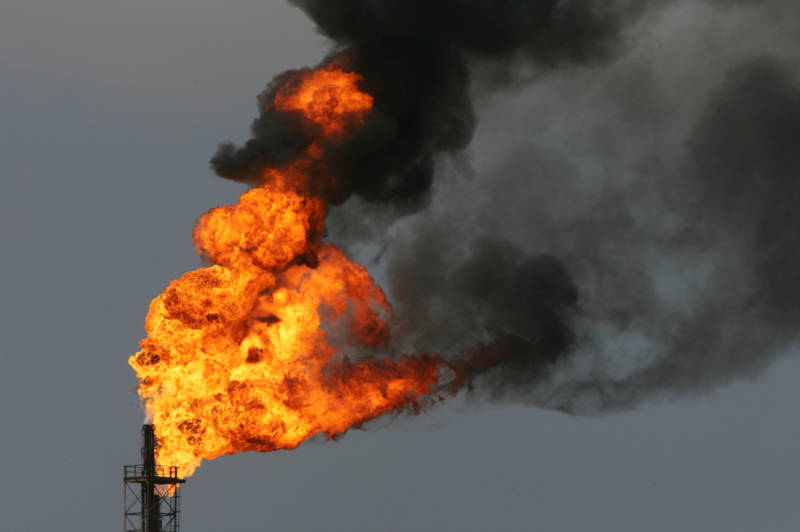The industry group warned that an outage as short as a minute could result in refineries going off line for up to three weeks, triggering a series of ugly consequences.
"An uncontrolled shutdown of a refinery from a de-energization action would result in immediate emergency load shedding, flaring and a heightened risk of a catastrophic event," the association wrote in a letter to the California Public Utilities Commission.
The filing has prompted an angry reaction from a leading environmental group, which says it fears the oil companies will use a power shutdown as a justification for harmful emissions.
"It's outrageous that action to protect against wildfire risk might result in dangerous pollution," said Clare Lakewood, a senior attorney at the Center for Biological Diversity. "Refineries shouldn't be allowed to use this as an excuse to contaminate the air we breathe."
When asked recently about the petroleum association's concerns, a PG&E representative said the utility would work to restore power faster for refineries after the shutoffs.
"We are continually working to analyze our systems, refine our procedures and further assess how we can minimize the impacts of a public safety power shutoff. This includes working towards the ability to be able to prioritize the re-energization of critical infrastructure like oil refineries," said Jeff Smith, a PG&E spokesman.
Two weeks after the association's filing, the commission approved PG&E's shutoff plans. Oil companies did not get the break they wanted.
But the association's concerns have not faded. The head of the industry group continues to call on the state's utilities to keep the power flowing to refineries even during periods of high fire danger.
"Unplanned shutdowns imposed by a utility can result in health, safety and environmental impacts," Catherine Reheis-Boyd, the group's president, said in a statement.
"If a utility's actions disrupt the fuel supply chain, this could significantly impact affordable fuel costs for businesses and consumers in California," Reheis-Boyd said. "Utilities need to make sure that they are investing adequate resources to protect critical facilities to ensure that any de-energization event is used as an absolute last resort and does not cause more harm to Californians."
PG&E Shutoff Plan Scrutinized
The industry's concerns were highlighted last week when state lawmakers scrutinized PG&E's shutoff plans. State Sen. Scott Wiener. D-San Francisco, mentioned the refineries while questioning a PG&E executive.
"We saw the oil industry, and I'm not usually aligned with the oil industry, but their letter was very compelling. That's pretty problematic for that to happen," Wiener said during a state Senate subcommittee hearing last Wednesday.
PG&E says it recently met with the industry to discuss its concerns, but it has not signaled an intention to alter its shutoff plans.
Sumeet Singh, the PG&E vice president overseeing the company's wildfire safety program, told the panel that the transmission system serving refineries is built with redundancy in mind.
"When you look at our transmission system, by nature, especially the 100-kilovolt and above ... there's quite a lot of reliability that's built into it," Singh said. That means "if you lose a line, you have another" line as a backup, he added.
Singh also suggested that the oil industries can take PG&E to court "if they fundamentally believe that the decision that we made was inaccurate, inappropriate, targeted in some way, led to some harm."
2017 Power Outage at Valero Refinery
An oil company lawsuit against the utility would not be unprecedented. A May 2017 power failure at Valero's Benicia plant triggered a major release of toxic sulfur dioxide and prompted emergency shelter-in-place orders.
The CPUC blamed PG&E for the outage, but declined to punish the company. Valero filed a lawsuit against the utility, seeking more than $75 million in damages. That lawsuit is currently on hold pending the outcome of PG&E's bankruptcy proceedings.
The industry's filing with the commission says the 2017 Valero outage proves the dangers an electricity failure poses to a refinery.
Currently, the Valero refinery is not in an area designated by PG&E as one at high risk for a public safety power shutoff. Solano County inspectors and Benicia fire officials note that the refinery gets power from two separate lines.
Terry Schmidtbauer, Solano County's assistant director of resource management, which oversees the Benicia facility, says the likelihood of Valero losing power from a pre-emptive shutoff is low.
"That being said, we are all aware of the past events where Valero did lose all power and had to shut down rather quickly. Such an event is not impossible, even if highly unlikely," Schmidtbauer said.
Both in 2017 and last March, when Valero shut down due to two refinery component malfunctions, the cost of gasoline in California increased.
Schmidtbauer said after the 2017 outage, county inspectors told Valero to set up a procedure by which it would rely more on fuel gas and steam to generate electricity at the plant to run the refinery if it were to lose power from PG&E.
A Valero spokeswoman did not respond to a request for comment.
Contra Costa County's refineries — the Chevron, Shell, Phillips 66 and Marathon plants — are expected to rely more on their cogeneration facilities and reduce refining in cases of power shutoffs, according to Randy Sawyer, the county's chief environmental health and hazardous materials officer.
"I am expecting that they will cut back on their operations so they can continue to operate somewhat on their own," Sawyer said.
Shell's Martinez refinery has emergency backup systems, but they are not enough to power the entire plant, according to Shell spokeswoman Ann Notarangelo.
"We do not have enough onsite generation to sustain plant operations in the event of a complete loss of power from PG&E," Notarangelo said.

